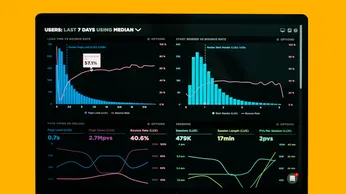How Can Sales Commission Automation Optimize Compensation Processes in EdTech?
EdTech firms face high-stakes sales with complex compensation needs. Sales commission automation reduces errors, drives motivation, and boosts visibility—powering smarter, faster, and fairer incentive decisions.
On this page
The U.S. EdTech industry is on a rapid upward trajectory, with projections estimating market growth to $236.1 billion by 2033 at a CAGR of 12.6% from 2025. As platforms expand and diversify their offerings across K-12, higher education, and workforce training, compensation complexity for sales teams rises exponentially.
In such a competitive and high-growth environment, traditional commission systems no longer suffice. Sales leaders, operations heads, finance managers, and HR teams in EdTech firms are increasingly turning to Sales Commission Automation in EdTech to address accuracy, efficiency, and transparency gaps.
How did the recent boom shape edtech sales strategies?
In recent years, the EdTech industry has experienced a defining inflection point. As schools, universities, and corporations rapidly shifted to online learning, the demand for digital education platforms skyrocketed. This surge accelerated the adoption of scalable, cloud-based solutions and transformed the sales playbook for EdTech companies.
Key sales strategies that fueled EdTech success post-pandemic include:
- Solution Selling: Top-performing EdTechs transitioned from product demos to needs-based selling, tailoring their pitch to address specific learning gaps and institutional pain points.
- Data-Driven Targeting: Advanced analytics and CRM integration enabled smarter prospecting, personalized outreach, and better lead prioritization.
- Hybrid Sales Models: Companies balanced inside sales teams with on-ground reps for districts, universities, and enterprises.
- Customer Education and Onboarding: Teams focused on long-term retention by improving product adoption, not just closing deals.
- Agile Incentive Structures: Fast-growing teams required compensation plans that could adapt quickly to product launches and new customer segments.
The result was a more mature, metrics-driven approach to sales—one that positioned revenue operations as a strategic growth lever rather than just a support function.
Why is motivation a challenge in high-pressure edtech sales environments?
The EdTech sales environment is fast-paced and target-intensive. Reps are often tasked with ambitious monthly quotas, complex sales cycles involving multiple stakeholders, and high customer expectations. This pressure can result in stress, burnout, and declining morale especially when recognition and visibility are lacking.
In this context, motivation strategies play a critical role. Two of the most effective methods include:
-
Gamification
Incorporating elements like leaderboards, milestone badges, and contests adds a sense of fun and healthy competition to daily tasks. It keeps sales reps engaged and provides dopamine boosts through visible wins.
-
Real-Time Visibility
Dashboards that show quota progress, earnings potential, and performance against peers help reps stay focused and self-correct quickly. When they know exactly where they stand, they can plan their activity more strategically.
Together, gamification and visibility transform stress into sales motivation shifting the narrative from "hitting targets" to "winning the day." Sales leaders who harness these tools often report higher engagement, faster ramp-up times, and stronger team culture.
Why does following up matter more than ever in edtech sales?
In EdTech sales, success doesn’t just depend on the first conversation, it’s often won in the follow-up. Yet, research shows that 80% of sales require at least five follow-up calls after the initial meeting. However, 44% of salespeople give up after just one follow-up (source). This gap between effort and outcome reveals a major performance blind spot.
With sales commission automation in Edtech, companies can structure their incentive programs to reward persistence and lead nurturing, not just conversions. Sales managers can:
- Set up micro-goals for follow-ups, tracked directly in CRM-integrated dashboards.
- Use performance nudges to encourage timely re-engagement with prospects.
- Allocate bonus structures tied to lead conversion rates over time.
By reinforcing the value of consistent follow-up through compensation design, teams not only improve their close rates but also build more reliable sales pipelines.
What problems do manual commission systems pose for edtech companies?
Despite their digital DNA, many EdTech companies still rely on spreadsheets and emails to manage commissions. These outdated tools introduce critical challenges:
- Manual calculation errors delay payouts and damage rep trust.
- Disconnected systems across CRM, ERP, and HR tools lead to reconciliation bottlenecks.
- Limited visibility demotivates sales reps who can’t track quota progress or earnings.
- Compliance risks emerge when payout records lack audit trails or standardized approval workflows.
These issues not only drain productivity but also undermine sales performance management essential to scaling revenue operations.
How does automation streamline sales compensation in edtech?
Implementing an Edtech sales commission automation addresses the above pain points with powerful benefits:
- Real-time earnings dashboards provide reps with on-demand access to performance and payout metrics.
- Automated crediting rules minimize errors and align payouts with real-time CRM data.
- Approval workflows reduce disputes and enhance interdepartmental transparency.
- Audit logs and clawback provisions ensure compliance with internal and external standards.
According to LeadSquared, sales commission automation can improve sales productivity by 14.5% in EdTech settings, freeing up bandwidth for strategic initiatives.
What features should you prioritize in a commission automation platform?
Not all tools are built alike. EdTech firms should look for these critical capabilities:
- Customizable plan logic based on user licenses, region, or product line.
- Integration with Salesforce, HubSpot, Zoho, and ERPs to enable seamless data flow.
- Scenario modeling and forecasting to budget and align sales incentives with business goals.
- Mobile-first dashboards for remote teams and inside sales reps to track earnings anytime.
Choosing the right platform ensures long-term agility and alignment across Edtech revenue operations and compensation strategies.
Can Automation Really Deliver Tangible Results? A Real-World Example
Absolutely. Consider this example:
An EdTech company, Level was manually managing complex commissions for its rapidly growing sales team. With no visibility or standardization, reps often raised disputes, and leaders spent hours reconciling spreadsheets.
After implementing Xoxoday Compass, the company:
- Reduced payout processing time by 70%
- Boosted rep satisfaction by 40% with transparent earnings dashboards
- Centralized all sales performance and incentive data for finance, HR, and ops
This transformation enabled them to scale incentive programs in sync with business growth. Read full case study.
What are the strategic benefits for sales, finance, and HR teams?
- For Sales Heads: Improved rep motivation, higher quota attainment, and fewer conflicts.
- For Operations Leaders: Streamlined workflows and cleaner data.
- For Finance Heads: Budget control and fewer manual interventions.
- For HR Leaders: Fair and auditable reward practices that reinforce retention.
Ready to transform your sales compensation with confidence?
As the EdTech space grows more competitive, your sales incentive system must evolve beyond spreadsheets. Embrace automation not just as a tech upgrade, but as a strategic investment in EdTech sales compensation efficiency, compliance, and team morale.
See how automated commission management can elevate your growth engine, Book a demo with Xoxoday Compass today.
FAQs
1. Why is sales commission management software important for EdTech companies?
Automation ensures accurate, timely payouts, minimizes manual errors, and aligns incentives with performance, especially in fast-paced, target-driven EdTech environments.
2. How does automation help improve sales productivity?
By reducing time spent on manual tasks like payout calculation and lead follow-up tracking, automation frees up sales reps to focus on closing deals and building relationships. It can boost productivity by 14.5%.
3. Can sales commission automation handle complex incentive structures in EdTech?
Yes. Modern platforms allow for customizable plans based on geography, product line, user tier, and more, supporting both fixed and variable components.
4. What kind of teams benefit from commission automation in EdTech?
Sales, finance, HR, and operations teams all benefit. It improves data accuracy, ensures fair compensation, reduces administrative work, and enhances transparency across departments.
5. How does automation support compliance and auditing?
Commission management software maintain detailed audit logs, manage clawbacks, and enforce policy rules—helping EdTech companies stay compliant with labor and financial regulations.















